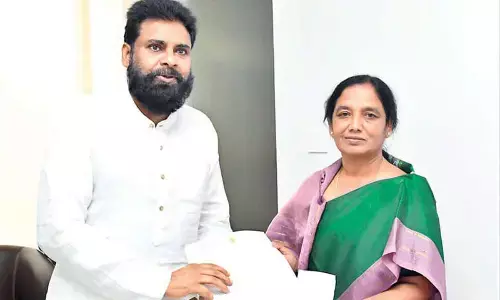Don’t allow FDI to grab people’s money

In 1994 a Committee headed by former RBIO Governor R N Malhotra came out with a report on the liberal ization of insurance sector in India.
.jpg) The BJP-led NDA came to power promising an alternative to the UPA. But the policies remain the same. Insurance Laws (Amendment) Bill 2008 aimed at hiking the Foreign Direct Investment limit to 49 per cent, which was introduced by UPA, is now being pursued by BJP government with full vigour. The Bill presently stands referred to a Select Committee chaired by Chandan Mitra. But even before the Select Committee of the Parliament could submit the report on the Bill, the Government is clamouring for the adoption of the Bill in the winter session.
The BJP-led NDA came to power promising an alternative to the UPA. But the policies remain the same. Insurance Laws (Amendment) Bill 2008 aimed at hiking the Foreign Direct Investment limit to 49 per cent, which was introduced by UPA, is now being pursued by BJP government with full vigour. The Bill presently stands referred to a Select Committee chaired by Chandan Mitra. But even before the Select Committee of the Parliament could submit the report on the Bill, the Government is clamouring for the adoption of the Bill in the winter session.
In 1994 a Committee headed by former RBIO Governor R N Malhotra came out with a report on the liberal ization of insurance sector in India.
The report recommended that (i) private companies be allowed into insurance sector including foreign capital and (ii) the public sector insurance companies be disinvested.
The BJP led NDA government, passed the IRDA Act in 1999 allowing private capital into insurance industry. The first private insurance company was given the licence in October 2000. The private companies were allowed a share of FDI up to 26 per cent.
But the people of the country kept their faith in the public sector insurance industry and even after 13 years of the private companies operating in the country, LIC retained its market supremacy and today holds 74 per cent of the market share with the other 23 companies contributing the balance among them.
Though the limit of 26 per cent was never a hindrance to the FDI to enter Indian insurance market, the private companies wanted their strength to go up by taking up higher FDI into their equity base. The demand for 49 per cent FDI started in 2004 when the UPA I came to power, which brought in Insurance Laws (Amendment) Bill increasing the FDI limit to 549 per cent in the Upper House four years later.
The Bill was referred to the Parliamentary Standing Committee on Finance, headed by Yashwant Sinha, which scrutinized and submitted its report to both the Houses of the Parliament in December 2011. In this report the Committee unanimously rejected the proposal to increase the limit of FDI to 49 per cent.
The Bill could not be passed during the UPA regime due to opposition from other political parties. It is unfortunate that now the Modi government has decided to get the Bill passed. Perhaps, BJP wants to prove that they are faster in implementing the neo-liberal agenda.
The Indian insurance industry is highly developed and technology adopted sector. In fact, LIC is equipped with best possible technology. Therefore, hike in FDI is not required for technology import. The Indian insurance industry has a large number of products designed to suit the needs of every section of population and there are continuous innovation of products to benefit the customers. Even on this count, there is absolutely no need for FDI.
The household savings in India were estimated at 21.9% of GDP for the financial year 2012-13. This would roughly translate into Rs.22 lakh crore. Even if 50 per cent of this were to come to financial assets, it would be a huge amount necessary for the Indian infrastructure needs. But the hike in FDI would allow foreign capital to gain greater access and control over our domestic savings. This will hasten the process of mergers and acquisitions. This surely cannot be in national interests.
It is pertinent to mention that insurance companies in US and Europe failed to protect the policyholders’ savings during the recent world economic crisis. The US government had to bail out insurance majors such as AIG.
That being the case, it is not prudent to fully open up our markets to the multi-national insurance companies.
It is natural for the multinational companies to demand further opening up of the insurance sector in India which is very promising with a young population. In spite of rising inflation resulting in lesser household savings, India has done well in insurance. Life insurance penetration in India at 3.1 per cent is noteworthy when compared to 2.9% of Canada and 3.1 per cent in Germany. India has a higher level of penetration than all the Latin American countries and many of the developed nations.
The World Bank supported Growth Commission under the chairmanship of Noble Laureate Michael Spence observed “our view is that foreign saving is an imperfect substitute for domestic saving, including public saving to finance the investment a developing economy requires.”
This observation and the experiences of FDI across the globe makes it clear that it is the domestic savings that provide most stable funds for investments in economy. Insurance industry plays the important role of providing security to the policyholders and converting the small savings into capital for investment in critical infrastructure sector. At a time when the government has to make heavy investments in infrastructure to create domestic demand, the savings mobilized through insurance play a very important role. Therefore, the government must gain total control over the domestic savings rather than allowing the foreign capital to use them for their speculative endeavours.
Lastly, an increase in the ceiling for the insurance sector will automatically translate into a similar FDI limit for the pension sector too. This paves way for the foreign capital to have a greater access over the long term savings both in life insurance and pension.









